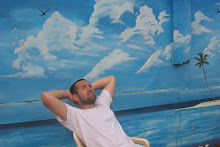...and they I read a bit from their project "Desk Killer":
In post-war Germany’s attempt to come to a reckoning with the Holocaust, particularly after the trial and conviction of Adolf Eichmann in 1961 the term 'schreibtischtaeter' was coined. This can be translated as 'desk-murderer'. Strangely this term has hardly ever been used outside Germany, despite its clear relevence [sic] to much 20th century and contemporary capitalism.It sounds a bit like Lev..."The main reason for the terrible cruelty between men today, apart from the absence of religion, is still the refined complexity of life which shields people from the consequences of their action."
This concept is at the heart of the desk killer's argument. International trade has never been less personal. The vast majority of BP's or Shell's workforce in London will never see the oil pipeline in Colombia or Nigeria that they work on daily from their desks, let alone meet the villagers intimidated, displaced or killed in order to enable those valuable pipelines to operate. This distancing creates the greatest imaginative challenge - how is it possible to link the BP head office at Finsbury Circus to Casanare? How is it possible to enable human beings in London to feel linked on a personal basis with human beings in Colombia? Or to link the people at the Shell Centre with people in Southern Nigeria?
But the reason I like Tolstoy and squirm at something like Desk Killer is that when I read Tolstoy, I see myself in the text, whereas Platform makes me think I am somehow disconnected from BP and Shell, which I don't think I am, even if I ride a bike instead of own a car. Still, the concept the "refined complexity of life" is an idea that has intrigued me for years. I hope they publish it soon.




No comments:
Post a Comment